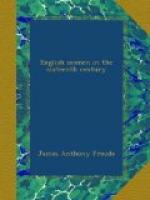So a Spanish officer describes the scene. The English story says nothing of the pinnace; but she doubtless came and went as the Spaniard says, and for sufficient purpose. The English, too, were in straits, though the Duke did not dream of it. You will remember that the last supplies which the Queen had allowed to the fleet had been issued in the middle of June. They were to serve for a month, and the contractors were forbidden to prepare more. The Queen had clung to her hope that her differences with Philip were to be settled by the Commission at Ostend; and she feared that if Drake and Howard were too well furnished they would venture some fresh rash stroke on the coast of Spain, which might mar the negotiations. Their month’s provisions had been stretched to serve for six weeks, and when the Armada appeared but two full days’ rations remained. On these they had fought their way up Channel. Something had been brought out by private exertion on the Dorsetshire coast, and Seymour had, perhaps, brought a little more. But they were still in extremity. The contractors had warned the Government that they could provide nothing without notice, and notice had not been given. The adventurers were in better state, having been equipped by private owners. But the Queen’s ships in a day or two more must either go home or their crews would be starving. They had been on reduced rations for near two months. Worse than that, they were still poisoned by the sour beer. The Queen had changed her mind so often, now ordering the fleet to prepare for sea, then recalling her instructions and paying off the men, that those whom Howard had with him had been enlisted in haste, had come on board as they were, and their clothes were hanging in rags on them. The fighting and the sight of the flying Spaniards were meat and drink, and clothing too, and had made them careless of all else. There was no fear of mutiny; but there was a limit to the toughest endurance. If the Armada was left undisturbed a long struggle might be still before them. The enemy would recover from its flurry, and Parma would come out from Dunkirk. To attack them directly in French waters might lead to perilous complications, while delay meant famine. The Spanish fleet had to be started from the roads in some way. Done it must be, and done immediately.




